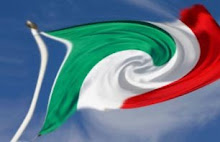
There is a coalition that has governed a country for 7 of the last 9 years, dominated the political agenda for the other 2, presided over a stagnating economy and a massive arrival of immigrants, its leader facing countless trials and sex allegations, substantiated by audio tapes that clearly link him to dodgy situations. There is a xenophobic party – playing second fiddle in this coalition - managed as a fiefdom by its rabble-rousing founder, flirting periodically with the idea of taking the country out of the euro, and repeatedly showing that general culture is not among the criteria to select its members.
In a moment when the economical crisis is still biting hard, immigrants are blamed for everything that goes wrong and taxes don't decrease as promised, what did the voters choose, in the regional elections held this week? More of the same, of course. The country being Italy, this translates in an electoral victory for PM Silvio Berlusconi, and even more for the second pillar in his coalition, Northern League's Umberto Bossi. Whose son, 21-year-old Renzo, has just won a seat – with the highest number of votes in his town – in Lombardy's regional council. Despite having failed twice – and scraped through on the third time – high school's final exam.
Italians happy with the present economic situation of the country are hard to find, unless you believe the government propaganda. I believe that even if you ask the average Berlusconi or Bossi voter if they are optimistic about the future, most of them will say they're not. Yet, they keep voting for the duo that has shaped Italy's politics for the last 10 years. The Northern League is stronger than ever, since its foundation over 20 years ago. Berlusconi is holding on thanks to his ally; but he can still claim over a quarter of the national vote, and be cheered by supporters when he utters nonsense slogans like “we are the Party of love, the other are only envious and hateful”. Somebody should tell that to Renzo Bossi, who last year developed a Facebook apps called “Bounce the illegal immigrant back” (to the sea).
There are plenty of reasons for this situation, all of them are valid – and I will discuss them in future posts. The opposition, after being battered time after time, still just doesn't get it. Apathy is spreading among centre-left voters. Berlusconi censors opposing voices in the media. But what this bizarre correlation – the country goes to the dogs, hail to the chief! - makes more evident, in my opinion, is the increasing disconnection of Italians from reality/rest of Europe/the world. And it's all part of the plan.
A provincial, uneducated, scoffing-on-culture, egoistic, scared-of-immigrants population wants a strong man to rule. Policies are too complicated: He knows how to do it for you. Those who disturb Him – judges, do-good leftists - are defeatists, enemy of the country. Foreign media criticizing Him – even conservative ones! - are only envious because your food is better than theirs. Immigrants take your jobs. Chinese are shifty and never die. Communists are always around, but until He's around they are luckily unable to harm you.
Not that in the past we were all Nobel laureates. But values were different. You would control yourself in public, instead of spewing racing insults and laugh about it. You would be uncomfortable about your lack of culture. You would work hard to reach a better position. But day after day, in the last 20 years, the importance of all this has been eroded by the media of you-know-who.
After decades of a stolid, self-censored Catholic cultural industry, the audience was receptive. The collapse of the old political order gave space to a tycoon-turned-politician who “says things as they are”. And still owns the media system, giving you light programmes, where fame and money are the key values, and sensible reasoning is impossible to formulate – someone will shout over you anyway, “saying things as they are”. Your leader speaks to the guts, not to your head. You don't need the latter: He thinks for you. And if you vote with the guts, when the world is a scary place, you vote for who promises to protect you from the dangers.





